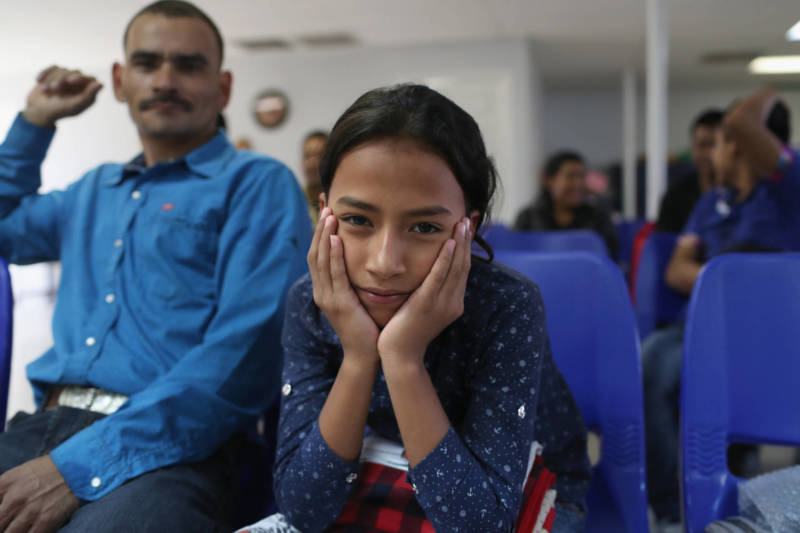People who have waited years to get their day in immigration court could wait years longer due to the ongoing partial federal government shutdown. The majority of immigration judges nationwide are currently furloughed, and most daily court proceedings have been canceled indefinitely until funding is restored.
Only cases for people detained by U.S. Immigration and Customs Enforcement are moving forward as scheduled, according to a Dec. 26 notice by the Executive Office of Immigration Review (EOIR), a division within the U.S. Department of Justice that oversees about 60 immigration courts.
The notice says hearings for the vast majority of pending immigration cases — involving individuals who are not detained — will be "reset for a later date."
Immigration courts nationwide have canceled nearly 43,000 proceedings. That number will likely grow by another 20,000 cancellations each week the shutdown continues, according to researchers at Syracuse University.
California is experiencing the most cancellations. The state already has the largest immigration court backlog in the country with more than 146,800 pending cases.
Immigration Case Backlog Grows
The funding stalemate — now in its fourth week — could significantly worsen California's immigration court backlog, according to judges and attorneys.
"We feel incredibly helpless and frustrated by all of this," said Dana Leigh Marks, a furloughed judge in San Francisco’s immigration court. "Situations like this current shutdown just blow our dockets apart.” Marks has 4,000 pending immigration cases.
Marks, the past president of the National Association of Immigration Judges, told KQED that 17 out of the court’s 20 judges are currently furloughed without guaranteed back pay, while hundreds of people are losing their court dates each week.
Marks said she'll try to "shoehorn" as many affected cases as she can into her schedule when she returns to work.
But she expects most lengthy proceedings, including merit hearings where noncitizens may present evidence or witnesses to make their case before a judge, to be shunted to the back of the line. That would force people to wait potentially another two or three years to see a judge, said Marks.
"It can be devastating for individuals," she said. "They can lose track of witnesses that they need to help present their case. They may have to pay lawyers all over again to prepare the case."
Requests for comments to officials in the EOIR went unanswered. One employee’s automated reply email said: "I have been furloughed and am currently out of the office."
Thousands of Court Appointments Canceled Each Week
Compared to the government shutdown in 2013, the current halt in immigration court operations has already affected a greater number of people, said Aaron Reichlin-Melnick, a policy analyst with the American Immigration Council in Washington, D.C.
"I think [this shutdown] is definitely going to increase the backlog more rapidly because there are more people in the system," said Reichlin-Melnick.
Based on case completions from previous years, he estimated immigration judges would have resolved more than 2,500 cases every week nationwide if it weren't for the shutdown.
Experiencing lengthy delays in hearings erodes people’s confidence in the court system, said Misha Seay, an immigration attorney with the nonprofit Community Legal Services in East Palo Alto.
Seay said in one instance, a client had a hearing rescheduled four times for reasons unrelated to the shutdown over a period of years. That has hurt her client's ability to plan for the future and move on with her life, said Seay.
"I start to see a helplessness in my clients," she said. "They seem to lose trust in the system and kind of believe that their case will never get heard."
In the last two weeks, Seay's nonprofit has seen the preliminary hearings of two clients canceled because of furloughs in immigration courts. One of those cases involved a woman with Down syndrome, who is applying for asylum.
"Our main concern is having the cases delayed, in particular for the asylum-seeker," said Seay. "The longer it takes to get through preliminary hearings, the longer it'll take to get to the final hearing, because the backlog is growing."
Nationwide, the average wait time for immigration cases to be resolved is almost two years.
Judge Marks said it's "ironic" the shutdown — over the president's demand for a border wall — is hobbling immigration courts in the country.
"If this is about good immigration enforcement, the immigration courts need to be up and working," said Marks, who has served on the bench for 33 years.
"So that people who should be removed from the United States can be removed in a reasonable period of time, and individuals who are entitled to remain under our immigration laws are given their day in court."
CLARIFICATION: (Editor's note 1/17/19) This story originally misstated that according to one estimate, immigration judges would have resolved more than 5,000 cases per week if it weren't for the shutdown. The correct estimate is more than 2,500 cases per week.
